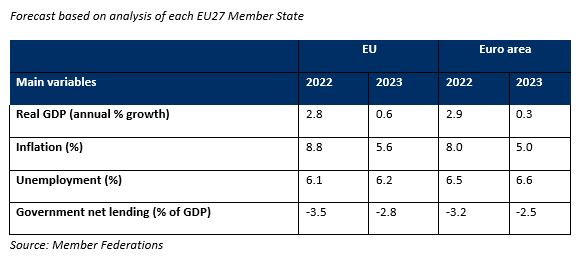BusinessEurope Economic Outlook Autumn 2022 – Businesses face a difficult winter as sentiment falls and costs rise
After a strong first half year driven by post-Covid service sector reopening, business sentiment has declined rapidly in recent months. Soaring energy bills and continuing supply chain disruptions mean costs for businesses are rising much faster than consumer inflation. With margins falling and the prospect of consumer demand also falling, many businesses are cutting production.
Our central forecast is for the EU economy to grow by 2.8% between 2021 and 2022. But we now expect EU growth of only 0.6% in 2023, compared to the 2.1% we expected in the summer. We expect euro area inflation of 8% in 2022, falling moderately to 5% in 2023. But even this disappointing outlook will depend upon no further increases in energy prices, a further easing of supply chain pressures, and policies that respond to the energy price shock in a timely, comprehensive, and well-balanced way.
Economic projections

Policy recommendations
- EU leaders need to agree urgently on new measures to alleviate energy costs for businesses. In particular, policymakers should consider EU-wide measures to temporarily decouple electricity prices from gas prices and grant governments the necessary flexibility to support businesses while maintaining a level playing field in the single market.
- In view of limited fiscal space in many Member States, measures to support consumers and businesses with energy costs must be temporary and well-targeted. Rapid agreement on the reform of the Stability and Growth pact can support member states in ensuring that the long-term strengthening of public finances is not unduly delayed. Effective use of public funds, notably the EU’s Recovery and Resilience Facility, is essential to boosting long-term investment growth.
- Any further normalisation of monetary policy through interest rate rises is likely to act as an additional drag on growth but may nevertheless be essential to help ensure inflation expectations remain well-anchored. Social partners can play an important role in helping to continue to prevent the emergence of a damaging wage-price spiral.
- In light of rising interest rates, policymakers should carefully monitor rising borrowing costs and facilitate the access to alternative financing sources for businesses, for example equity financing, whilst not coming at the expense of debt-financed instruments. Calibrating the Basel III rules must maintain the ability of businesses to access bank lending and safeguard their competitiveness vis-à-vis international competitors.